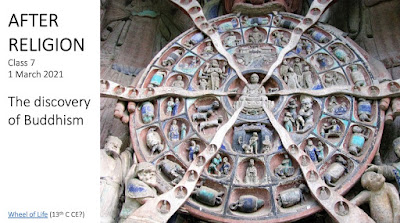In the Great Discourse on the Lion’s Roar (Mahāsīhanāda Sutta)—a famous text from the Pali canon, the oldest collection of texts and, according to many, the collection that best represents his teachings—the Buddha declares, “Should anyone say of me: ‘The recluse Gotama does not have any superhuman states, any distinction in knowledge and vision worthy of the noble ones. The recluse Gotama teaches a Dhamma [merely] hammered out by reasoning, following his own line of inquiry as it occurs to him’—unless he abandons that assertion and that state of mind and relinquishes that view, then as [surely as if he has been] carried off and put there, he will wind up in hell.” (45-46)
But a funny thing happened on the way to prerecording the lecture. Something Lopez mentions in half-jest at the end of his book snuck in and turned the tables. Turns out "The Discovery of Buddhism" doesn't have to mean "X's discovery of Buddhism." It could also mean "The discovery Buddhism made." But what was this? Lopez' suggestion was that the "secular" humanistic Buddha the Victorians thought they discovered, discontinuous though he doubtless was with the tradition he was thought to have founded, may still have served an indispensable purpose in spreading awareness of the Buddhist dharma. Buddhist believe there wasn't just one Buddha: maybe the "scientific Buddha," discontinuous as he was, was really a Buddha after all!
 I used this possibility to suggest that 'Buddhism' might offer us excitingly new ways of thinking about history - and about religion. The story of those things people imagine and deride as world religions doesn't have to be a secular one (a secularized Protestant one). This is a version of a point I've made in many classes over the years, but I didn't realize I was setting up in this one. 没想到我会被佛教发现了!
I used this possibility to suggest that 'Buddhism' might offer us excitingly new ways of thinking about history - and about religion. The story of those things people imagine and deride as world religions doesn't have to be a secular one (a secularized Protestant one). This is a version of a point I've made in many classes over the years, but I didn't realize I was setting up in this one. 没想到我会被佛教发现了!